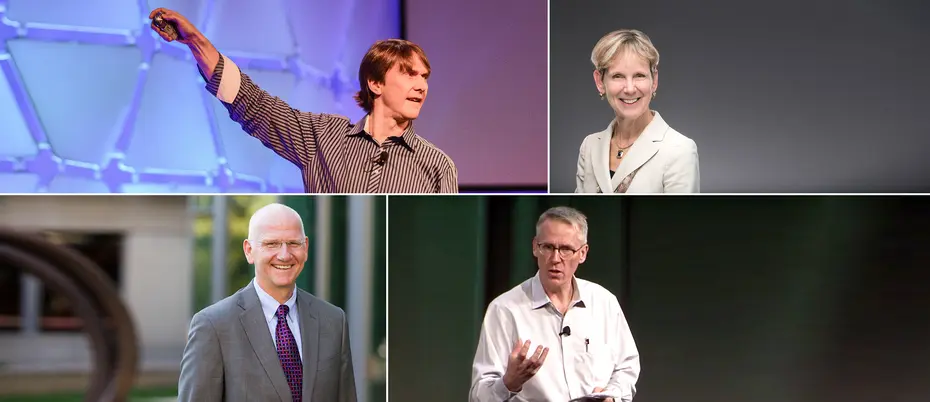Digital Economy
5 key business insights from Thinkers50 nominees
MIT Sloan researchers who made the Thinkers50 shortlist are championing the power of platforms and the value of strategic questioning.
Ask questions, invest in platforms, and focus on designing an agile digital business — these insights propelled members of the MIT community onto the shortlist for the 2019 Thinkers50 Awards, given biennially to business thought leaders from around the world.
principal research scientist at the MIT Sloan Center for Information Systems Research, was nominated for the Digital Thinking Award for her research about how companies can retool for digital success. MIT Initiative for the Digital Economy fellows Geoffrey G. Parker and Marshall W. Van Alstyne were also nominated for the Digital Thinking Award for their work on platform revolutions and the concept of the inverted firm.
the executive director of the MIT Leadership Center, was nominated for the Leadership Award for his focus on how asking the right questions drives change and leadership success. He won the award in 2017. This year's awards will be given out in London in November.
Here’s a deeper look at research from MIT nominees.
Today’s successful businesses don’t just offering high-quality products or services — they create platforms to connect producers and consumers in high value exchanges. As Parker, Van Alstyne, and their colleague Sangeet Paul Choudary write in their book “Platform Revolution,” companies like Airbnb and Uber gain from information and interactions. Investing in platforms allows companies to connect consumers and providers in two-sided markets.
In traditional business models, companies controlled the factors that led to their success. Parker and Van Alstyne argue that today’s successful companies have upended that model, with value creation coming from sources outside the company's control. Google and Apple, for example, rely on an ecosystem of external developers, which allows the companies to scale faster and reap the rewards. The result is a move from internal production to external orchestration.
Successful businesses are able to respond quickly to rapid changes. “Business models change every day,” Ross said at the recent MIT CIO Symposium. “Unlike past business success, success in the digital economy is not so much about brilliant strategy, it’s about being able to execute constantly changing strategy.
”What does this look like in practice? Focus on small, cross-functional, agile teams. Successful companies should be able to quickly experiment with new offerings and either execute and scale them or discard them and move on, Ross said.
Becoming a successful digital business isn’t easy, and thoughtful design is a key part of success. In her forthcoming book, “Designed for Digital: How to Architect Your Business for Sustained Success,” Ross and her colleagues lay out some of the building blocks for digital transformation, including an operational backbone, a digital platform, and an accountability framework.
In studying companies that were well on the road to becoming digital businesses, two things stood out, Ross said. “They had a least some kind of operational backbone to give them data, and they had some kind of customer insights that helped them change their habits and recognize new value propositions to offer their customers,” she said.
Gregersen’s research about leadership shows the power of asking questions. Innovative leaders recognize that they might be in isolated positions and create intentional strategies to fix that — even if they might be uncomfortable. One case in point: a question burst, Gregersen’s method of sitting through a series of rapid-fire questions without providing the answers. Focusing on questions rather than answers provides a new, less-familiar lens to explore issues and leads to better brainstorming, Gregersen proposes. Leaders should also aim for “catalytic questions,” which dissolve barriers to creative thinking and channel the pursuit of solutions.
Two other members of the MIT community earned spots on the Thinkers50 shortlist. William R. Kerr, PhD ’05, was nominated for a Talent Award for his research on how businesses and economies grow and how global talent flows reshape businesses and society, and MIT Practical Impact Alliance advisor Simone Ahuja was nominated for the innovation award for her “disrupt yourself” system to help organizations sustain innovation.




